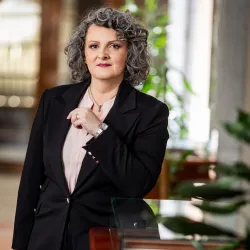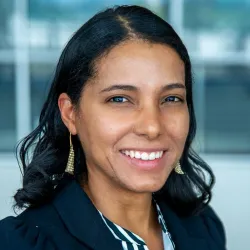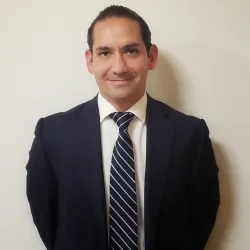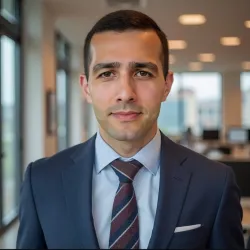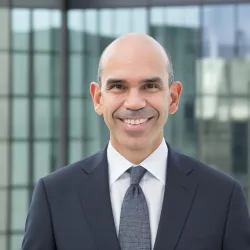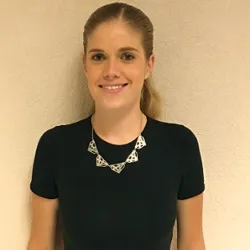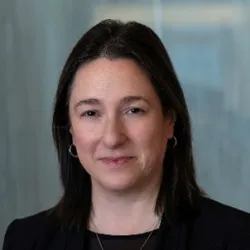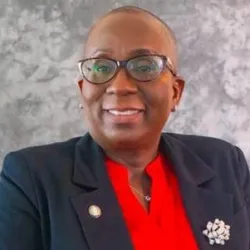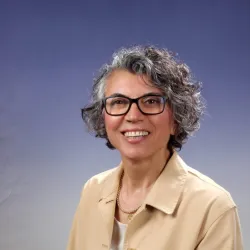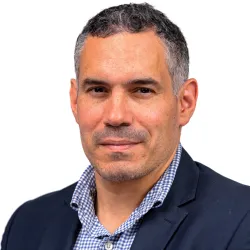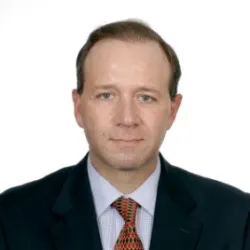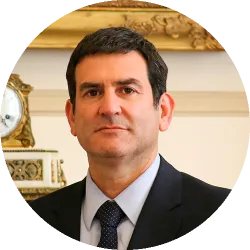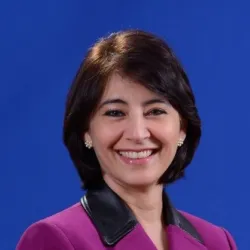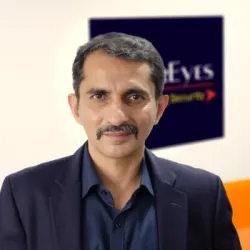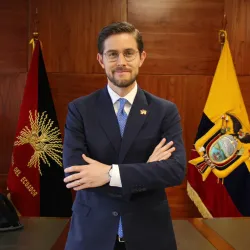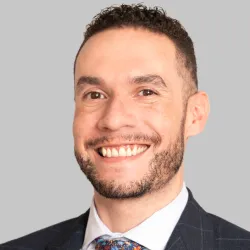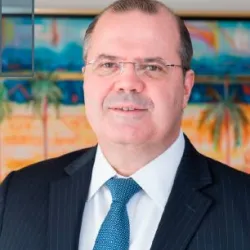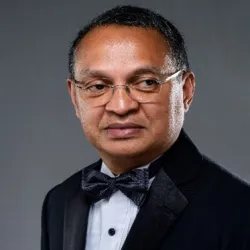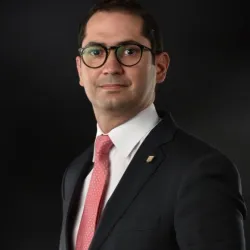Agenda 2024
Agenda 2024
Agenda 2024
Reserve Management - 13th November
08:00 – 09:00
Registration & breakfast
08:00 - 09:00
09:00 – 09:15
Welcome to the Central Banking Autumn Meetings
09:00 - 09:15
Christopher Jeffery is Editor of Central Banking Publications, which includes the Central Banking Journal, CentralBanking.com and Central Banking On Air. He has more than 15 years of experience covering banking, business, economics, finance and public policy in London, Hong Kong and New York. His interviews include those with Agustín Carstens, Stanley Fisher, Stefan Ingves, Ahmed Alkholifey, Raghuram Rajan, Robert Schiller and Christopher Sims. Chris is Chairman of the Central Banking Awards Committee and is Editor of IFF China Report, a publication offering insight and opinion from China’s top policymakers. Chris was previously Editor of Asia Risk in Hong Kong and Deputy Editor of Risk in London
09:15 – 09:45
Opening keynote address
09:15 - 09:45
Jasmina Selimović, Ph.D. was appointed at the position of CBBH Governor on January, 2024. The newly appointed Governor, who is also the Presiding of the CBBH Governing Board, has a doctorate in economic sciences.
Since 2004, she has been employed at the School of Economics and Business in Sarajevo, at the Department of Finance and the Department of Quantitative Economics. She completed her postgraduate studies at the School of Economics and Business in Sarajevo, in Business Economics, with Actuarial and Insurance, major course. She prepared her doctoral dissertation in the field of actuarial science in the USA, and defended it at the School of Economicas and Business, University in Sarajevo. As a full professor, she teaches courses in the fields of Finance, Quantitative Economics and Actuarial Science at the School of Economics and Business in Sarajevo.
In addition to being involved in the teaching process, she performed the duties of Deputy Head of the Department of Finance, Vice Dean for Teaching and International Cooperation, and in 2018 she was elected to the position of Dean of the School. In 2022, she renewed her four-year mandate.
She is a member of numerous professional associations in the country and abroad. She is active in the world organizations for accreditation of business schools and universities (AACSB and EFMD), and she is engaged as an international expert for accreditation at quality assurance agencies in EU countries.
She is the author and co-author of several books and chapters in monographs, numerous scientific and professional articles, published in internationally indexed magazines. She participated in many international and domestic conferences and projects.
From 2011 to 2015, she was a member of the Advisory Group of the Fiscal Council of Bosnia and Herzegovina. Since 2018, she was an independent member of the Supervisory Board of Raiffeisen Bank BiH.
By the decision of the Presidency of Bosnia and Herzegovina, she was appointed as a member of the Governing Board of the Central Bank of Bosnia and Herzegovina, for a mandate period of six years, starting on January 3, 2024.
09:45 – 10:00
Chair’s opening remarks
09:45 - 10:00
Elisa Vilorio de Painter holds a PhD in Economics from Florida International University (FIU). She holds a Master of Science in Finance and a Postgraduate degree in Risk Management from the Instituit D'administration d'enterprise (IAE) Aix en Provence in France, and is a Magna Cum Laude Industrial Engineer from the Pontificia Universidad Católica Madre y Maestra (PUCMM). She is also a former scholar of the prestigious Fulbright Program of the United States Embassy and the scholarship program of the French Embassy.
She has worked at the Central Bank of the Dominican Republic since 2007, and currently holds the position of Advisor to the Governor. She began her career in the Treasury Department where she held the positions of Technical Consultant, Deputy Director of International Reserves Management, Head of the Risk and Financial Analysis Division, and Investment Manager of the International Reserves portfolio. For more than a decade, she was responsible for the design and execution of the investment strategy of the International Reserves portfolio, quantitative analysis, risk management, and strategic asset allocation. In turn, she participated in official advisory missions to other Central Banks within the Reserves Advisory Management Program (RAMP) of the World Bank.
Her areas of professional expertise are: Financial Economics, International Economics, Applied Econometrics and Finance. She has presented her research on macroeconomics at different annual meetings of the American Economic Association (AEA), the Southern Economic Association (SEA), the Midwest Economic Association (MEA), the Eastern Economic Association (EEA), the International Atlantic Economic Society (IAES) and the International Trade and Finance Association (ITFA). She has also published in various Journals related to the active management of an International Reserves portfolio, hedging strategies using interest rate futures and the foreign exchange derivatives market.
She has been an undergraduate professor and researcher at Florida International University (FIU). She also taught in the Master's in Financial Management and MBA in Risk and Treasury Management at the Pontificia Universidad Católica Madre y Maestra.
10:00 – 11:00
Evaluating 2024 global financial markets and paving the way for a robust 2025 market strategy
10:00 - 11:00
Sponsored by:

- 2024: A year in search for soft landing, restrictive monetary policy and volatile interest rates
- Geopolitical realignment are pushing central bankers to rethink their reserve make-up and portfolios
- A year of macroeconomic forecasting errors and high expectations from the Fed, leaving many central bankers confused
- 2025: Expectations for the markets in the next 12 months and thoughts on having a viable 2% inflation target rate
Arnab Das is Global Market Strategist at Invesco in the EMEA region, based in London, and a member of Invesco’s Global Thought Leadership team. He helps develop and communicate analysis and insight on the global economy and financial markets across asset classes for clients, media, governments and central banks.
He works with Invesco’s investment teams across disciplines and regions and is a member of Invesco’s Global Investor Forum Advisory Council with a focus on global macro and emerging markets. Arnab’s research interests span economic policy, performance and reform; and economic and financial history.
Arnab joined Invesco in 2015 as Head of EM macro research for Invesco Fixed Income. He began his career in finance in 1992, and has served as Co-head of Economic Research & Strategy at Roubini Global Economics; Co-head of Global Economics & Strategy, Head of Global FX Research, and Head of EM Economics & Strategy at Dresdner Kleinwort; and Head of EEMEA Research at JP Morgan. He has also been a private consultant in global and emerging markets, as well as consulting with Trusted Sources, a specialist EM research boutique.
Arnab’s studies were in macroeconomics, economic history and international political economy. He received an AB from Princeton University in 1986 and completed his postgraduate and doctoral work at the London School of Economics in 1987-1992.
Gerardo García is the Director of International Operations of Banco de México, and as such, is responsible for the investment of the Central Bank’s foreign currency reserves. The Central Bank is also the financial agent of the Federal Government; therefore, Mr. García is also responsible for the foreign currency transactions and the implementation of hedging programs on behalf of the Mexican Government. His former responsibilities included the management of both the Fixed Income and Foreign Exchange Divisions at the Central Bank of Mexico. Mr. García holds a B.A. degree in Economics from the Instituto Tecnológico de Monterrey (1999) and a Master in Business Administration (MBA) degree from Yale University (2005).
Ali Akbulut, Principal Portfolio Manager, Foreign Reserves Management at the Bank of Canada, is responsible for managing the swaps portfolio which is used to fund and hedge Canada’s foreign reserves investments. His responsibilities include contributing to the development of funding and investment strategies and providing regular briefings to the Bank’s senior leadership on financial and market developments.
Prior to joining the Bank of Canada, Ali worked for buy-side and sell-side institutions, as well as in consulting.
Ali holds a Master of Science in Finance from HEC Montreal and is a CFA charterholder.
Mr. Franz Hamann is Director of the Macroeconomic Modelling Department of the Bank of the Republic, Colombia. He has published in academic and policy journals specialized in macroeconomics and international economics. He has more than 20 years’ experience in macro modeling, analysis and forecasting at the Colombian central bank and has been visiting scholar at the Federal Reserve Bank of St. Louis, International Monetary Fund Consultant and has advised several central banks of emerging economies, as well as the Czech National Bank. He holds a Ph.D. at North Carolina State University.
11:00 – 11:30
Networking tea and coffee break
11:00 - 11:30
11:30 – 12:30
Post-election strategies for asset-allocation and diversification
14:30 - 15:30
Sponsored by:

- With the U.S. election outcome settled, post-election market volatility may prompt portfolio managers to adopt a more tactical approach towards U.S. bonds and treasuries. How are reserve managers adjusting their views in response?"
- Will the dollar strengthen or weaken and how are US treasury markets going to be impacted?
- How are external asset managers assessing the last quarter?
- The overall impact of all the above on emerging markets and the “cost of carry”.
Elisa Vilorio de Painter holds a PhD in Economics from Florida International University (FIU). She holds a Master of Science in Finance and a Postgraduate degree in Risk Management from the Instituit D'administration d'enterprise (IAE) Aix en Provence in France, and is a Magna Cum Laude Industrial Engineer from the Pontificia Universidad Católica Madre y Maestra (PUCMM). She is also a former scholar of the prestigious Fulbright Program of the United States Embassy and the scholarship program of the French Embassy.
She has worked at the Central Bank of the Dominican Republic since 2007, and currently holds the position of Advisor to the Governor. She began her career in the Treasury Department where she held the positions of Technical Consultant, Deputy Director of International Reserves Management, Head of the Risk and Financial Analysis Division, and Investment Manager of the International Reserves portfolio. For more than a decade, she was responsible for the design and execution of the investment strategy of the International Reserves portfolio, quantitative analysis, risk management, and strategic asset allocation. In turn, she participated in official advisory missions to other Central Banks within the Reserves Advisory Management Program (RAMP) of the World Bank.
Her areas of professional expertise are: Financial Economics, International Economics, Applied Econometrics and Finance. She has presented her research on macroeconomics at different annual meetings of the American Economic Association (AEA), the Southern Economic Association (SEA), the Midwest Economic Association (MEA), the Eastern Economic Association (EEA), the International Atlantic Economic Society (IAES) and the International Trade and Finance Association (ITFA). She has also published in various Journals related to the active management of an International Reserves portfolio, hedging strategies using interest rate futures and the foreign exchange derivatives market.
She has been an undergraduate professor and researcher at Florida International University (FIU). She also taught in the Master's in Financial Management and MBA in Risk and Treasury Management at the Pontificia Universidad Católica Madre y Maestra.
Ximena Alfarache Morales, Manager of International Operations, Banco de México
Mrs. Alfarache is the Manager International Operations at Banco de México. Her main responsibilities include supervising the international reserves portfolio´s investments (around 215 bln. US dollars) mainly invested in US, Chinese, European, Canadian and Australian and New Zealand debt, specifically the Tactical Asset Allocation of those investments. She also supervises the Asset Management and Securities Lending Program. She has worked for the bank since 2008, and her former positions at the bank include fixed income trader, head of the US fixed income desk and head of the FX and currencies desk. She holds a Bachelor’s degree in Economics from ITAM as well as a Master in Finance degree by the same institution, both graduated with honors.
Carlos Antonio Cano is responsible for the research, design and implementation of the strategic asset allocation of Peru’s FX Reserves and leads the BCRP’s external asset management program. Before taking up his current assignments, he led the development of strategic projects in the BCRP’s International Operations Department. He holds a bachelor’s degree in industrial engineering from the University of Lima, Perú, and an MBA with focus on asset management and investment research from Cornell University, USA.
Johanna Lasker
CEO, North America and head of central banks and institutions
BNP Paribas Asset Management
Johanna is the CEO North America for BNP Paribas Asset Management (BNPP AM). She is also the Head of Central Banks and Official Institutions.
As CEO for North America, Johanna is responsible for our strategic leadership and development. She manages the growth of our business, overseeing business development, and maintaining direct oversight of management and effective governance in the region. In her capacity as Head of Central Banks & Official Institutions, Johanna’s responsibilities include managing and growing the official sector business globally, while also ensuring we are meeting our clients’ needs.
Johanna originally joined FFTW, a predecessor of BNPP AM, in 1997. She then left the firm in 2000, rejoining in 2004 to focus on the official institutions business. Since 2013, she has been the head of the Central Banks and Official Institutions team, successfully growing our client base and increasing our AUM for this sector. In addition to working for BNPP AM and FFTW, Johanna worked in the Corporate Finance division at UBS for two years, where she was an Associate Director in the Consumer Products Group in New York. She later transferred to the Global Industrial Group in Japan where she lived for a year.
Johanna has over 20 years of experience. She earned an MBA in Finance and International Business from New York University, and a BA in East Asian Studies from Stanford University. She is based in New York.
Ricardo da Costa Martinelli
Senior advisor of the reserve management department
Central Bank of Brazil
Senior Advisor of the Reserve Management Department at Banco Central do Brasil (BCB). Has worked as trader, strategist and portfolio manager for different fixed income desks at BCB in the last 19 years, covering the US, Europe, Canada, Japan and Emerging Markets. Previously, worked for 2 years at the House of Representatives as an economic assistant. Mr. Martinelli has a Ph.D. in Economics and solid experience in portfolio management, macroeconomics and finance.
In 2020 he has been appointed as representative for the BCB at NGFS’s subgroup on portfolio management.
12:30 – 12:45
Group photo
12:30 - 13:00
12:45 – 14:00
Networking lunch
13:00 - 14:15
14:00 – 14:30
Keynote address- Bridging Resilience and Inclusion: Navigating Uncertainty in a Transforming Global Economy
14:00 - 14:30
Valda Frederica Henry is the Deputy Governor of the Eastern Caribbean Central Bank. She is VF Inc.’s former Chief Executive Officer and Principal Trainer. She formerly served as a Senior Investment Officer at the Eastern Caribbean Central Bank and played an instrumental role in the restructuring of the Investment Unit and the development of the Investment Management Framework of the Bank. She has lectured in, among other subjects, Human Resource Management and Accounting and has extensive experience in organisational reviews, job analyses and job descriptions working with companies in the Caribbean and served as the Coordinator of the Administrative Reform Program of the Commonwealth of Dominica. She has served as a Mentor for Executive and Middle Managers in many sectors including banking, hospitality and utility. Valda is also a Global Human Resources and Organizational Development Expert who excels at collaboration, with very strong interpersonal, communications, leadership and decision-making skills. She has developed and led numerous multi-year personal and professional development programs for youth in Dominica as well as individuals and businesses throughout the Caribbean. She hosted a weekly radio and twice- monthly television programs on which she discussed solutions to challenges faced by businesses in the region. She wrote a Column, “Business and Life,” for the online newspaper, “Dominica News Online. Valda holds formal qualifications in Financial Analysis and Planning, Governance and Business Management. She is a Chartered Financial Analyst, holds a PhD in Industrial Relations & Business, Masters of Business Administration, Bachelors in Management and Bachelors in Law. She is a Certified Global Professional in Human Resources, Society for Human Resource Management, Senior Certified Professional (SHRM-SCP) and an Accredited Director. She is also a Certified ProNet Trainer and a Myers Briggs Type Indicator (MBTI) Practitioner and a Certified “Train the Trainer” for InfoDev and the Women Innovators Network in the Caribbean (WINC).
14:30 – 15:30
Monetary policy shifts, macroeconomic forces and reserves management
11:30 - 12:30
Sponsored by:

- What effect do reserve currency central bank monetary policy decisions mean for their attractiveness?
- The impact of monetary policy divergence and convergence on the dollar, renminbi and euro, and smaller reserve currencies such as the yen and emerging market currencies
- How does this impact diversification strategies? Balancing strategic vs tactical asset allocation, incorporating new asset classes to adapt and evolve to changing economic conditions
- Assessing gold’s renewed strength and reliability as a safe haven asset and opportunities for generating returns
Kurtuluş Taşkale Diamondopoulos, Director, Central Banks and Public Policy, World Gold Council. She works with official sector investment managers at central banks and SWFs around the world exploring the case for gold as a reserve asset as well as working on a wide variety of policy initiatives that affect the gold market.
Before joining the Council in 2016, she worked at the Central Bank of Turkey for 25 years. She acted in a leading role in the reserve and risk management as well as structuring the acceptance of gold within the framework of Reserve Option Mechanism. She holds MA in International Economics and Finance degree from Brandeis University, USA.
Juan Carlos Quintero
Senior financial officer, Reserve advisory and management partnership
World Bank
Juan is a Senior Financial Officer in the World Bank Treasury, where he works as an engagement manager for the Reserves Advisory and Management Partnership (RAMP). He is responsible for coordinating and developing capacity building programs and technical assistance for RAMP’s members.
Prior to joining RAMP, Juan was the Chief Investment Officer of Fogafin, Colombia’s deposit insurance agency, overseeing the investment of all portfolios and reporting directly to the institution’s board of directors. He also worked on resolution strategies, financial crisis simulations, and liability modeling. Additionally, Juan has substantial experience in reserve management. He began his career as a portfolio manager for Colombia’s central bank, where he was later promoted to head of risk management and as the technical advisor to the Deputy Governor supporting the bank’s strategic planning. As head of risk management, he led the development of investment guidelines and risk management initiatives, and he supervised the external management program.
He holds a bachelor’s degree in engineering from Universidad de los Andes in Colombia, as well as a master’s degree in applied economics and a master’s degree in applied statistics, both from the University of Michigan in the United States. Juan also has a PhD in Finance from EDHEC Business School in France. He is a CFA and an FRM charterholder.
Roberts Grava is Chief Executive Officer of Crown Agents Investment Management. He brings over 25 years of global institutional asset management experience to the firm, having focused mainly on sovereign investment institutions and official sector investment issues. He has held several senior roles in public and private sector institutions, including Head of Official Institutions, Institutional Solutions and Advisory and Managing Director, Fixed Income at J.P. Morgan Asset Management, Head of Quantitative Strategies, Risk and Analytics and Engagement Manager, Reserves Advisory and Management Program (RAMP) at the World Bank. Previously, he had spent 11 years as Chief Investment Officer, Head of Reserves Management and Market Operations and Member of the Executive Board at Latvijas Banka, the central bank of Latvia. He has a degree in Economics from Columbia University and is a CFA charterholder.
Malick Dioume is a seasoned central banking professional with extensive experience in foreign reserves management and risk management. As Director of Risk Management at the Central Bank of Haiti (BRH), Malick has overseen the development of strategic asset allocation frameworks and led significant reforms in the foreign reserves management framework. His work has focused on ensuring regulatory compliance and aligning the bank’s investment strategies with its long-term objectives.
Over the years, Malick has participated in numerous high-level seminars hosted by institutions such as the Federal Reserve, World Bank, and Bundesbank, on various topics revolving around foreign reserves management and risk management. He has also contributed to key projects at the Central Bank of Haiti (BRH), notably the 2015 Caribbean Financial Stability Report and a feasibility study on the creation of a stock market in Haiti.
Malick graduated from HEC Montreal and began his career in Canada, working in consulting and for a commercial bank, before moving to Haiti to pursue his central banking career. He regularly shares his insights on global financial markets, macroeconomic trends, and the evolving role of central banks in reserve management.
Fun Fact: Malick was an instrumental part of BRH's team that reached the final of the football tournament at the 2018 Central Banking Games of the Caribbean in St. Kitts, where his team lost to the Central Bank of Jamaica on penalty kicks. His dream is to see the creation of a World Cup for central banks and to participate in it.
Elisa Vilorio de Painter holds a PhD in Economics from Florida International University (FIU). She holds a Master of Science in Finance and a Postgraduate degree in Risk Management from the Instituit D'administration d'enterprise (IAE) Aix en Provence in France, and is a Magna Cum Laude Industrial Engineer from the Pontificia Universidad Católica Madre y Maestra (PUCMM). She is also a former scholar of the prestigious Fulbright Program of the United States Embassy and the scholarship program of the French Embassy.
She has worked at the Central Bank of the Dominican Republic since 2007, and currently holds the position of Advisor to the Governor. She began her career in the Treasury Department where she held the positions of Technical Consultant, Deputy Director of International Reserves Management, Head of the Risk and Financial Analysis Division, and Investment Manager of the International Reserves portfolio. For more than a decade, she was responsible for the design and execution of the investment strategy of the International Reserves portfolio, quantitative analysis, risk management, and strategic asset allocation. In turn, she participated in official advisory missions to other Central Banks within the Reserves Advisory Management Program (RAMP) of the World Bank.
Her areas of professional expertise are: Financial Economics, International Economics, Applied Econometrics and Finance. She has presented her research on macroeconomics at different annual meetings of the American Economic Association (AEA), the Southern Economic Association (SEA), the Midwest Economic Association (MEA), the Eastern Economic Association (EEA), the International Atlantic Economic Society (IAES) and the International Trade and Finance Association (ITFA). She has also published in various Journals related to the active management of an International Reserves portfolio, hedging strategies using interest rate futures and the foreign exchange derivatives market.
She has been an undergraduate professor and researcher at Florida International University (FIU). She also taught in the Master's in Financial Management and MBA in Risk and Treasury Management at the Pontificia Universidad Católica Madre y Maestra.
15:30 – 16:00
Networking tea and coffee break
11:00 - 11:30
16:00 – 16:45
Working groups - Navigating a New Global Financial and Economic Landscape
15:45 - 16:45
In this session, participants will be divided into groups to analyse a complex and evolving scenario: The rise of trade tensions and geopolitical risks, marked by the U.S. imposing tariffs on other countries, is presenting new challenges. These challenges include increased inflation expectations in the U.S., a surge in commodity prices, and a flight to quality in global markets. Simultaneously, the rapid adoption of digital transformation is accelerating the development of digital currencies among major advanced economies, including the EUR, USD, and JPY
Elisa Vilorio de Painter holds a PhD in Economics from Florida International University (FIU). She holds a Master of Science in Finance and a Postgraduate degree in Risk Management from the Instituit D'administration d'enterprise (IAE) Aix en Provence in France, and is a Magna Cum Laude Industrial Engineer from the Pontificia Universidad Católica Madre y Maestra (PUCMM). She is also a former scholar of the prestigious Fulbright Program of the United States Embassy and the scholarship program of the French Embassy.
She has worked at the Central Bank of the Dominican Republic since 2007, and currently holds the position of Advisor to the Governor. She began her career in the Treasury Department where she held the positions of Technical Consultant, Deputy Director of International Reserves Management, Head of the Risk and Financial Analysis Division, and Investment Manager of the International Reserves portfolio. For more than a decade, she was responsible for the design and execution of the investment strategy of the International Reserves portfolio, quantitative analysis, risk management, and strategic asset allocation. In turn, she participated in official advisory missions to other Central Banks within the Reserves Advisory Management Program (RAMP) of the World Bank.
Her areas of professional expertise are: Financial Economics, International Economics, Applied Econometrics and Finance. She has presented her research on macroeconomics at different annual meetings of the American Economic Association (AEA), the Southern Economic Association (SEA), the Midwest Economic Association (MEA), the Eastern Economic Association (EEA), the International Atlantic Economic Society (IAES) and the International Trade and Finance Association (ITFA). She has also published in various Journals related to the active management of an International Reserves portfolio, hedging strategies using interest rate futures and the foreign exchange derivatives market.
She has been an undergraduate professor and researcher at Florida International University (FIU). She also taught in the Master's in Financial Management and MBA in Risk and Treasury Management at the Pontificia Universidad Católica Madre y Maestra.
16:45 – 17:00
Chair's closing remarks
16:45 - 17:00
Elisa Vilorio de Painter holds a PhD in Economics from Florida International University (FIU). She holds a Master of Science in Finance and a Postgraduate degree in Risk Management from the Instituit D'administration d'enterprise (IAE) Aix en Provence in France, and is a Magna Cum Laude Industrial Engineer from the Pontificia Universidad Católica Madre y Maestra (PUCMM). She is also a former scholar of the prestigious Fulbright Program of the United States Embassy and the scholarship program of the French Embassy.
She has worked at the Central Bank of the Dominican Republic since 2007, and currently holds the position of Advisor to the Governor. She began her career in the Treasury Department where she held the positions of Technical Consultant, Deputy Director of International Reserves Management, Head of the Risk and Financial Analysis Division, and Investment Manager of the International Reserves portfolio. For more than a decade, she was responsible for the design and execution of the investment strategy of the International Reserves portfolio, quantitative analysis, risk management, and strategic asset allocation. In turn, she participated in official advisory missions to other Central Banks within the Reserves Advisory Management Program (RAMP) of the World Bank.
Her areas of professional expertise are: Financial Economics, International Economics, Applied Econometrics and Finance. She has presented her research on macroeconomics at different annual meetings of the American Economic Association (AEA), the Southern Economic Association (SEA), the Midwest Economic Association (MEA), the Eastern Economic Association (EEA), the International Atlantic Economic Society (IAES) and the International Trade and Finance Association (ITFA). She has also published in various Journals related to the active management of an International Reserves portfolio, hedging strategies using interest rate futures and the foreign exchange derivatives market.
She has been an undergraduate professor and researcher at Florida International University (FIU). She also taught in the Master's in Financial Management and MBA in Risk and Treasury Management at the Pontificia Universidad Católica Madre y Maestra.
17:00 – 18:00
Cocktail reception
17:00 - 18:00
Sponsored by:

18:00 – 21:00
Central Banking Fintech and Regtech Awards 2024
This is an invite-only awards ceremony
18:00 - 21:00
Innovation - 13th November
08:00 – 09:00
Registration & breakfast
08:00 - 09:00
09:00 – 09:15
Welcome to the Central Banking Autumn Meetings
09:00 - 09:15
Christopher Jeffery is Editor of Central Banking Publications, which includes the Central Banking Journal, CentralBanking.com and Central Banking On Air. He has more than 15 years of experience covering banking, business, economics, finance and public policy in London, Hong Kong and New York. His interviews include those with Agustín Carstens, Stanley Fisher, Stefan Ingves, Ahmed Alkholifey, Raghuram Rajan, Robert Schiller and Christopher Sims. Chris is Chairman of the Central Banking Awards Committee and is Editor of IFF China Report, a publication offering insight and opinion from China’s top policymakers. Chris was previously Editor of Asia Risk in Hong Kong and Deputy Editor of Risk in London
09:15 – 09:45
Opening keynote address
09:15 - 09:45
Jasmina Selimović, Ph.D. was appointed at the position of CBBH Governor on January, 2024. The newly appointed Governor, who is also the Presiding of the CBBH Governing Board, has a doctorate in economic sciences.
Since 2004, she has been employed at the School of Economics and Business in Sarajevo, at the Department of Finance and the Department of Quantitative Economics. She completed her postgraduate studies at the School of Economics and Business in Sarajevo, in Business Economics, with Actuarial and Insurance, major course. She prepared her doctoral dissertation in the field of actuarial science in the USA, and defended it at the School of Economicas and Business, University in Sarajevo. As a full professor, she teaches courses in the fields of Finance, Quantitative Economics and Actuarial Science at the School of Economics and Business in Sarajevo.
In addition to being involved in the teaching process, she performed the duties of Deputy Head of the Department of Finance, Vice Dean for Teaching and International Cooperation, and in 2018 she was elected to the position of Dean of the School. In 2022, she renewed her four-year mandate.
She is a member of numerous professional associations in the country and abroad. She is active in the world organizations for accreditation of business schools and universities (AACSB and EFMD), and she is engaged as an international expert for accreditation at quality assurance agencies in EU countries.
She is the author and co-author of several books and chapters in monographs, numerous scientific and professional articles, published in internationally indexed magazines. She participated in many international and domestic conferences and projects.
From 2011 to 2015, she was a member of the Advisory Group of the Fiscal Council of Bosnia and Herzegovina. Since 2018, she was an independent member of the Supervisory Board of Raiffeisen Bank BiH.
By the decision of the Presidency of Bosnia and Herzegovina, she was appointed as a member of the Governing Board of the Central Bank of Bosnia and Herzegovina, for a mandate period of six years, starting on January 3, 2024.
09:45 – 10:00
Chair's opening remarks
09:10 - 09:20
Filipe Dinis served as the Bank of Canada’s first Chief Operating Officer (COO) from 2014 until his retirement from the Bank in June 2024. As COO, he oversaw the Bank’s operations, strategic planning, risk and corporate functions, including the currency function, with a focus on cybersecurity and operational resilience.
Throughout his tenure, Mr. Dinis was a leader of innovation, driving the digital transformation of the Bank’s operations and promoting the adoption of new technologies and approaches to better face future challenges.
Mr. Dinis promoted innovation and resilience beyond the Bank as well and led the creation of the Canadian Financial Sector Resiliency Group, a public-private partnership responsible for coordinating sector-wide responses to systemic-level operational incidents and for strengthening the financial sector’s critical infrastructure.
Before joining the Bank, Mr. Dinis served in the Privy Council Office as Assistant Secretary to the Cabinet, providing strategic advice and analysis to the Clerk of the Privy Council on business transformation and public service renewal. He also served as Secretary to the Prime Minister’s Advisory Committee on the Public Service. Before that, he was Chief Financial Officer and Assistant Commissioner at the Canada Revenue Agency.
Mr. Dinis holds a Bachelor of Commerce from McGill University and is a chartered professional accountant. He currently serves as Chair of the Audit and Finance Committee on the Board of Directors of the Children’s Hospital of Eastern Ontario. In 2023, he was made a CPA Fellow in recognition of his exceptional leadership and contributions to the profession and to his community. Mr. Dinis also received the Queen’s Diamond Jubilee Medal.
10:00 – 10:45
Central banks as pioneers and regulators of advancing financial technology and payments
10:00 - 11:00
- Deep diving into the booming instant payments presence in the Americas
- Revolutionising remittances and cross-border payments within and across regions
- Payment innovations in accelerating fast payments, affordability, convenience and customer-centric design for digital financial services
- Improving and implementing new measures in fintech governance, data oversight and regulation
Shamika Walrond is an Assistant Advisor in the Governor’s Office at the Central Bank of Barbados, bringing over nine years of experience in central banking. In February 2024, she transitioned to this advisory role after serving as Head of the External Sector Unit and Senior Economist in the Research and Economic Analysis Department. Among her key responsibilities, Ms. Walrond leads as Project Coordinator for Barbados' Payments System Modernisation Project, a strategic initiative focused on enhancing the nation’s financial infrastructure. She holds a BSc in Economics from the University of the West Indies, Barbados, and an MSc in Economics and Econometrics from the University of Nottingham, UK.
Mr Moad Fahmi, CFA is Chief FinTech Officer at the Bermuda Monetary Authority (Authority or BMA). Mr. Fahmi's leads specialised teams that manage the regulatory authorisation and supervision of innovative business models, including InsurTech digital assets, investments and money service businesses. Mr. Fahmi’s Team is also tasked with fostering FinTech innovation while ensuring robust consumer protections, through the strategic operation of the BMA’s Innovation Hub and Regulatory Sandbox.
Prior to joining the Authority in August 2018, Mr. Fahmi was Director - Fintech and Innovation at the Autorité des Marchés Financiers (AMF), the integrated regulator of the financial services sector for the province of Quebec, Canada.
Before joining the AMF, Mr. Fahmi held senior roles within the Banking sector in Canada.
Mr. Fahmi holds a Bachelor of Business Administration in Finance from HEC Montreal and an executive certificate in Public Policy from Harvard Kennedy School of Government. He obtained his Chartered Financial Analyst (CFA) Charter in 2011.
Jose Antonio is currently a Senior Advisor for the Payment Systems Development Group of the World Bank. He has also worked as a senior consultant for the Bank for International Settlements, UNCTAD and several central banks.
Jose Antonio is mostly involved in assisting countries in the implementation of fast payment systems, in assessing and developing financial market infrastructures, and in financial inclusion initiatives. He has also had substantial involvement in financial literacy initiatives.
From June 2009 to March 2012, he served as Deputy CEO at INFONACOT, a state-owned financial institution based in Mexico City that provides consumer loans to lower income workers.
From March 2004 to May 2009, Jose Antonio was a Senior Payment Systems Specialist at the World Bank. Prior to joining the World Bank Mr. Garcia was a Senior Economist at the Centre for Latin American Monetary Studies (CEMLA) and a Credit Analysis Specialist at Banco Inbursa, both in Mexico City.
11:00 – 11:30
Networking tea and coffee break
11:00 - 11:30
11:30 – 12:30
A new era of unified ledgers, tokenisation, AI and CBDC in transforming finance
11:30 - 12:30
- What have we learned from CBDC pilots and programmes so far?
- The quest for solving the problem of interoperability to build a global cross-border digital infrastructure
- The future of the financial system using unified ledgers, tokenisation and AI
- The need for robust regulation and accountability in maintaining security and integrity
ALBERTO NAUDON DELL'ORO is Board Member of the Central Bank of Chile since March 2018. Before his appointment to the Board and since September 2014, he was Director of the Research Division of this Institution.
He is a Commercial Engineer from the Pontifical Catholic University of Chile, where he received the Raúl Iver award as the best graduate among his 2000 classmates, and holds a Master's Degree and PhD in Economics from the University of California at Los Angeles, USA.
He joined the Research Division of the Central Bank as an Economist in 2000, where he served as Chief Economist and then as Head of the Macroeconomic Modeling and Forecasting Department. In 2013, he held the position of Chief Economist at Banco de Crédito e Inversiones, where he worked for one year.
Among his academic activities he has been a professor at the University of Chile, the Pontifical Catholic University of Chile, the University of Los Andes, and the Adolfo Ibáñez University, teaching courses in the areas of Macroeconomics, Econometrics and International Economics.
He has also researched and published several papers on monetary policy and financial issues.
Jon Frost heads the Economics for the Americas (EFTA) team in the BIS Americas Office in Mexico City. He has published on fintech, big tech in finance, central bank digital currencies, stablecoins, capital flows, and technology and inequality. Previously, Jon worked in the BIS Innovation and the Digital Economy (IDE) unit, and prior to that at the Financial Stability Board, the Netherlands Bank, VU University in Amsterdam, and in the private sector in Germany. Jon holds a PhD in economics from the University of Groningen. He is a research affiliate of the Cambridge Centre for Alternative Finance at the University of Cambridge, and has served as a Board member in the FinTech@CSAIL initiative of the Massachusetts Institute of Technology (MIT).
Ádám Nyikes has been working at the Magyar Nemzeti Bank (MNB), the central bank of Hungary since 2020. In this role, he is actively supporting the digitalization of the incumbent banking system, promoting FinTech innovation and playing a crucial role in the development of CBDC-related initiatives. As a CBDC expert he participated in the successful development of the first retail CBDC pilot project in the European Union involving retail users and played a pivotal role in the MNB’s blockchain testing pilot project. He also leads the annual evaluation of the Hungarian banking system's digitalization level and regularly contributes to central bank publications. Mr. Nyikes graduated in 2021 with a degree in economic analysis at Corvinus University of Budapest.
Jeville John is a Senior Analyst with the Bank of England in the Bank’s Central Bank Digital Currency Directorate. His main responsibilities include developing the regulatory expectations and standards for private sector firms in delivering CBDC. He holds a Bachelor’s degree in Law with First Class Honours from the University of the West Indies, as well as a Master of Laws in International Banking and Finance Law from University College London (UCL). Jeville also holds an executive education certificate in FinTech and Regulatory Innovation from the Cambridge Centre for Alternative Finance, Cambridge Judge Business School.
12:30 – 12:45
Group photo
12:30 - 13:00
12:45 – 14:00
Networking lunch
13:00 - 14:15
14:00 – 14:30
Keynote address- Bridging Resilience and Inclusion: Navigating Uncertainty in a Transforming Global Economy
14:00 - 14:30
Valda Frederica Henry is the Deputy Governor of the Eastern Caribbean Central Bank. She is VF Inc.’s former Chief Executive Officer and Principal Trainer. She formerly served as a Senior Investment Officer at the Eastern Caribbean Central Bank and played an instrumental role in the restructuring of the Investment Unit and the development of the Investment Management Framework of the Bank. She has lectured in, among other subjects, Human Resource Management and Accounting and has extensive experience in organisational reviews, job analyses and job descriptions working with companies in the Caribbean and served as the Coordinator of the Administrative Reform Program of the Commonwealth of Dominica. She has served as a Mentor for Executive and Middle Managers in many sectors including banking, hospitality and utility. Valda is also a Global Human Resources and Organizational Development Expert who excels at collaboration, with very strong interpersonal, communications, leadership and decision-making skills. She has developed and led numerous multi-year personal and professional development programs for youth in Dominica as well as individuals and businesses throughout the Caribbean. She hosted a weekly radio and twice- monthly television programs on which she discussed solutions to challenges faced by businesses in the region. She wrote a Column, “Business and Life,” for the online newspaper, “Dominica News Online. Valda holds formal qualifications in Financial Analysis and Planning, Governance and Business Management. She is a Chartered Financial Analyst, holds a PhD in Industrial Relations & Business, Masters of Business Administration, Bachelors in Management and Bachelors in Law. She is a Certified Global Professional in Human Resources, Society for Human Resource Management, Senior Certified Professional (SHRM-SCP) and an Accredited Director. She is also a Certified ProNet Trainer and a Myers Briggs Type Indicator (MBTI) Practitioner and a Certified “Train the Trainer” for InfoDev and the Women Innovators Network in the Caribbean (WINC).
14:30 – 15:30
Cybersecurity: an increasing critical concern for central banks
14:15 - 15:15
Sponsored by:

- Building a cyber-resilient mindset and framework to mitigate the rising threat of cyberattacks and strengthen resilience in digital money systems
- Cyber risk management, governance and due diligence strategies
- Third-party risk management: a balancing act for central banks - IT vendors improve operational efficiency whilst also exposing the financial industry to systemwide shocks
- International cooperation among public authorities to help improve, mitigate and respondent to cyber incidents
Eliud "El-G" Ramocan is responsible for cyber resilience and threat intelligence at the Bank of Jamaica, leading Jamaica’s cyber resilience framework for the financial sector and also chairs the Cyber Risk Technical Working Group of the Caribbean Group of Bank Supervisors.
With a distinguished background in technology, economics and strategy early in his career, El-G was designated a short-term IMF Technical Assistance Expert at age 28 and later appointed by his country to upgrade the cyber infrastructure across the military, police force and mission-critical systems in cooperation with the Government of Israel. Following this, he was seconded to the Financial Services Commission in Jamaica as CIO where he orchestrated a swift and successful recovery following a major ransomware attack. With a wealth of resilience, he crafted his country’s Ten Cyber Resilience Principles for the Financial Sector, alongside policies centred on cyber risk governance and cybersecurity preparedness.
He holds a degree in Computer Science and Economics and an MBA from the University of the West Indies. Then further pursued studies at Harvard Kennedy School of Government focusing on Cybersecurity Policy and Strategic Management for Regulatory and Enforcement Agencies. Giving back, he lectures at the university-level in cybersecurity, risk governance and project management and travels extensively as a speaker and accomplished author.
Arvinder Bharath brings to bear a blend of experience spanning over 30 years in technology, banking, and policy setting. She started her career in technology working with corporates, conglomerates and tech and telecom giants such as British Telecom, Nortel Systems, Cisco, Compaq and Hewlett Packard. She later joined Barclays Bank where she held senior positions in technology, mergers, acquisitions, and separations across the globe. She then returned to the Caribbean to lead RBC Royal Bank as president and country head for Trinidad and Tobago. Arvinder subsequently moved to the Central Bank of Trinidad and Tobago as Deputy Inspector of Financial Institutions, transitioning to lead Financial Technology, Information Security and Knowledge and Information departments. She is currently a Digital Risks Expert with the IMF where she provides technical assistance to member countries in management of digital and cyber risks arising from digitalization of the financial services sector, public financial management and adoption of digital currencies. She is involved in various international working groups and forums on transformative technologies such as Quantum Computing, generative AI, DeFi and others.
Arvinder holds a BSc Hons in Information Technology and an MBA in Banking – both from the University of London.
Karmendra Kohli is a cybersecurity leader with over 23 years of experience in information/cyber security and information risk management. As the CEO and co-founder of SecurEyes, Karmendra has transformed a two-person start-up into a global cybersecurity company, known for delivering cutting-edge security solutions tailored to complex sectors such as finance, government, and healthcare.
With a Master's in Computer Applications and advanced certifications including CISSP, CISA, CRISC, and CISM, he combines technical expertise with a deep understanding of strategic business needs.
Under Karmendra's leadership, SecurEyes has become a trusted partner for over 700 clients across 12 countries, including prominent names in both the public and private sectors. His focus on operational excellence and client-centered solutions has driven the company to conduct more than 14,000 security assessments and gain accolades for several global projects.
A recognised figure in cybersecurity, Karmendra regularly speaks at prominent conferences, sharing insights on the evolving cyber threat landscape and innovations in cyber resilience. He has also served as an advisor to senior management and boards of directors, helping organizations shape their cybersecurity strategies in the face of a rapidly changing threat environment.
Karmendra’s mission is to empower organisations with secure, adaptive, and compliant digital ecosystems. He is passionate about fostering a culture of digital trust and resilience, particularly in critical infrastructure sectors. Looking forward, he aims to further SecurEyes’ global reach, supporting enterprises and governments in their cybersecurity transformation journeys while developing future leaders in the information security industry.
15:30 – 16:00
Networking break
11:20 - 11:50
16:00 – 16:45
Working groups - Innovation in Central Banking: Opportunities and Risks
16:00 - 16:45
Organizations are being seized by the introduction of technologies at a record speed. These technologies will continue to impact how institutions deliver on their mandates. Artificial Intelligence is real, is here to stay and will only continue to evolve. Central Banks are not immune to these impacts which could have implications on internal operations and on policy development. With this context in mind, participants will discuss what it means to be an “Innovative Central Bank” and discuss opportunities and risks in delivering our mandates.
Filipe Dinis served as the Bank of Canada’s first Chief Operating Officer (COO) from 2014 until his retirement from the Bank in June 2024. As COO, he oversaw the Bank’s operations, strategic planning, risk and corporate functions, including the currency function, with a focus on cybersecurity and operational resilience.
Throughout his tenure, Mr. Dinis was a leader of innovation, driving the digital transformation of the Bank’s operations and promoting the adoption of new technologies and approaches to better face future challenges.
Mr. Dinis promoted innovation and resilience beyond the Bank as well and led the creation of the Canadian Financial Sector Resiliency Group, a public-private partnership responsible for coordinating sector-wide responses to systemic-level operational incidents and for strengthening the financial sector’s critical infrastructure.
Before joining the Bank, Mr. Dinis served in the Privy Council Office as Assistant Secretary to the Cabinet, providing strategic advice and analysis to the Clerk of the Privy Council on business transformation and public service renewal. He also served as Secretary to the Prime Minister’s Advisory Committee on the Public Service. Before that, he was Chief Financial Officer and Assistant Commissioner at the Canada Revenue Agency.
Mr. Dinis holds a Bachelor of Commerce from McGill University and is a chartered professional accountant. He currently serves as Chair of the Audit and Finance Committee on the Board of Directors of the Children’s Hospital of Eastern Ontario. In 2023, he was made a CPA Fellow in recognition of his exceptional leadership and contributions to the profession and to his community. Mr. Dinis also received the Queen’s Diamond Jubilee Medal.
16:45 – 17:00
Closing remarks by the chair
16:45 - 17:00
Filipe Dinis served as the Bank of Canada’s first Chief Operating Officer (COO) from 2014 until his retirement from the Bank in June 2024. As COO, he oversaw the Bank’s operations, strategic planning, risk and corporate functions, including the currency function, with a focus on cybersecurity and operational resilience.
Throughout his tenure, Mr. Dinis was a leader of innovation, driving the digital transformation of the Bank’s operations and promoting the adoption of new technologies and approaches to better face future challenges.
Mr. Dinis promoted innovation and resilience beyond the Bank as well and led the creation of the Canadian Financial Sector Resiliency Group, a public-private partnership responsible for coordinating sector-wide responses to systemic-level operational incidents and for strengthening the financial sector’s critical infrastructure.
Before joining the Bank, Mr. Dinis served in the Privy Council Office as Assistant Secretary to the Cabinet, providing strategic advice and analysis to the Clerk of the Privy Council on business transformation and public service renewal. He also served as Secretary to the Prime Minister’s Advisory Committee on the Public Service. Before that, he was Chief Financial Officer and Assistant Commissioner at the Canada Revenue Agency.
Mr. Dinis holds a Bachelor of Commerce from McGill University and is a chartered professional accountant. He currently serves as Chair of the Audit and Finance Committee on the Board of Directors of the Children’s Hospital of Eastern Ontario. In 2023, he was made a CPA Fellow in recognition of his exceptional leadership and contributions to the profession and to his community. Mr. Dinis also received the Queen’s Diamond Jubilee Medal.
17:00 – 18:00
Cocktail reception
17:00 - 18:00
Sponsored by:

18:00 – 21:00
Central Banking Fintech and Regtech Awards 2024
This is an invite-only awards ceremony
18:00 - 21:00
Reserve Management - 14th November
08:00 – 09:00
Breakfast and networking
08:30 - 09:15
08:00 – 09:15
Interbank working groups
This is a Central Banking Institute invite-only breakfast and group discussion
08:30 - 09:30
Sponsored by:

09:15 – 09:30
Welcome to Day 2 of the Central Banking Autumn Meetings
09:00 - 09:15
Christopher Jeffery is Editor of Central Banking Publications, which includes the Central Banking Journal, CentralBanking.com and Central Banking On Air. He has more than 15 years of experience covering banking, business, economics, finance and public policy in London, Hong Kong and New York. His interviews include those with Agustín Carstens, Stanley Fisher, Stefan Ingves, Ahmed Alkholifey, Raghuram Rajan, Robert Schiller and Christopher Sims. Chris is Chairman of the Central Banking Awards Committee and is Editor of IFF China Report, a publication offering insight and opinion from China’s top policymakers. Chris was previously Editor of Asia Risk in Hong Kong and Deputy Editor of Risk in London
09:30 – 10:00
Keynote: Central Bank of Ecuador’s Reserve Management and Innovation in a Dollarized Economy
09:15 - 10:00
Guillermo Avellánobtained his bachelor’s degree in business economics with a minor in finance from the University of Richmond (USA). Mr. Avellán holds a master’s degree in economic analysis from the Barcelona School of Economics (Spain). Finally, he concluded executive programs in macroprudential policies and gold reserves management at Columbia University.
Mr. Avellán started his career as an analyst and advisor of the investment division at the Central Bank of Ecuador. He also worked as a corporate banking analyst at Citi-Ecuador and as a senior analyst on risk management at Banco Bolivariano. In addition, he was a full-time professor of macroeconomics and finance at Espiritu Santo University. He served as research director at the Guayaquil Chamber of Commerce and Ecuador Libre think tank.
Since June 2021, he has been the General Manager of the Central Bank of Ecuador. He also served as President of Ecuador’s Public Debt Committee between June 2021 and August 2022.
10:00 – 10:15
Chair's opening remarks
09:45 - 10:00
Elisa Vilorio de Painter holds a PhD in Economics from Florida International University (FIU). She holds a Master of Science in Finance and a Postgraduate degree in Risk Management from the Instituit D'administration d'enterprise (IAE) Aix en Provence in France, and is a Magna Cum Laude Industrial Engineer from the Pontificia Universidad Católica Madre y Maestra (PUCMM). She is also a former scholar of the prestigious Fulbright Program of the United States Embassy and the scholarship program of the French Embassy.
She has worked at the Central Bank of the Dominican Republic since 2007, and currently holds the position of Advisor to the Governor. She began her career in the Treasury Department where she held the positions of Technical Consultant, Deputy Director of International Reserves Management, Head of the Risk and Financial Analysis Division, and Investment Manager of the International Reserves portfolio. For more than a decade, she was responsible for the design and execution of the investment strategy of the International Reserves portfolio, quantitative analysis, risk management, and strategic asset allocation. In turn, she participated in official advisory missions to other Central Banks within the Reserves Advisory Management Program (RAMP) of the World Bank.
Her areas of professional expertise are: Financial Economics, International Economics, Applied Econometrics and Finance. She has presented her research on macroeconomics at different annual meetings of the American Economic Association (AEA), the Southern Economic Association (SEA), the Midwest Economic Association (MEA), the Eastern Economic Association (EEA), the International Atlantic Economic Society (IAES) and the International Trade and Finance Association (ITFA). She has also published in various Journals related to the active management of an International Reserves portfolio, hedging strategies using interest rate futures and the foreign exchange derivatives market.
She has been an undergraduate professor and researcher at Florida International University (FIU). She also taught in the Master's in Financial Management and MBA in Risk and Treasury Management at the Pontificia Universidad Católica Madre y Maestra.
10:15 – 11:15
Fireside chat: FX markets- Examining central bank interventions in the currency market
14:15 - 15:15
- Impact of central bank FX interventions to mitigate currency volatility and ensure sufficient market liquidity
- Examining what worked and what did not in regulatory market intervention
- How do central banks respond to market fluctuations with changing expectations from the Fed
- How can markets expect more certainty when it comes to central bank intervention in FX markets
Dr. Juan-Carlos Castañeda has worked for Banco de Guatemala (the Guatemalan central bank) in several positions for 35 years. He is currently the Director of the Economic Research Department at the Bank. As such, he is in charge of leading the economic research activities of the staff in the Department. He also leads the processes of development, implementation, management, and evaluation of the main macroeconomic models for inflation forecasting and monetary policy advice at the Bank.
He has taught courses in Economics and Monetary Policy at Universidad del Valle, Universidad Francisco Marroquín and Universidad Rafael Landívar in Guatemala. He has published specialized articles in several journals, including the Latin American Journal of Central Banking.
Dr. Castañeda obtained a Ph.D. in Economics from University of California – Los Angeles (UCLA). He also holds two Master’s degrees in Economics, one from UCLA and the other from Pontificia Universidad Católica de Chile. He obtained his Bachelor's degree in Economics from Universidad Rafael Landívar (Guatemala).
Elisa Vilorio de Painter holds a PhD in Economics from Florida International University (FIU). She holds a Master of Science in Finance and a Postgraduate degree in Risk Management from the Instituit D'administration d'enterprise (IAE) Aix en Provence in France, and is a Magna Cum Laude Industrial Engineer from the Pontificia Universidad Católica Madre y Maestra (PUCMM). She is also a former scholar of the prestigious Fulbright Program of the United States Embassy and the scholarship program of the French Embassy.
She has worked at the Central Bank of the Dominican Republic since 2007, and currently holds the position of Advisor to the Governor. She began her career in the Treasury Department where she held the positions of Technical Consultant, Deputy Director of International Reserves Management, Head of the Risk and Financial Analysis Division, and Investment Manager of the International Reserves portfolio. For more than a decade, she was responsible for the design and execution of the investment strategy of the International Reserves portfolio, quantitative analysis, risk management, and strategic asset allocation. In turn, she participated in official advisory missions to other Central Banks within the Reserves Advisory Management Program (RAMP) of the World Bank.
Her areas of professional expertise are: Financial Economics, International Economics, Applied Econometrics and Finance. She has presented her research on macroeconomics at different annual meetings of the American Economic Association (AEA), the Southern Economic Association (SEA), the Midwest Economic Association (MEA), the Eastern Economic Association (EEA), the International Atlantic Economic Society (IAES) and the International Trade and Finance Association (ITFA). She has also published in various Journals related to the active management of an International Reserves portfolio, hedging strategies using interest rate futures and the foreign exchange derivatives market.
She has been an undergraduate professor and researcher at Florida International University (FIU). She also taught in the Master's in Financial Management and MBA in Risk and Treasury Management at the Pontificia Universidad Católica Madre y Maestra.
11:15 – 11:45
Networking tea and coffee break
11:00 - 11:30
11:45 – 12:45
Presentation: Reserve requirements as a financial stability instrument
10:00 - 11:00
Reserve requirements can be used as a macroprudential tool to manage credit and systemic risks. They can reduce the build-up of systemic risk and the frequency of financial distress episodes. However, during normal times, reserve requirements make loans more expensive, which reduces credit and could dampen economic activity.
Carlos Cantu
Lecturer and former BIS senior economist at the monetary economics department
Instituto Tecnológico Autónomo de México
Carlos Cantú is currently Lecturer at the Instituto Tecnológico Autónomo de México and was previously the senior economist at the monetary economics department at the BIS. He obtained his MA and PhD in economics from the University of California, Los Angeles. Before obtaining his PhD, he worked for the Bank of Mexico in the Economic Research Department. He is part of the secretariat of the BIS Consultative Group on Innovation and the Digital Economy Technical Task Force on CBDCs.
12:45 – 13:15
Keynote Address - Embracing Uncertainty: Monetary Policy in Latin America
12:45 - 13:15
13:15 – 14:45
Networking lunch
13:00 - 14:15
14:45 – 15:45
2025: Global outlook and the future of financial markets: Governor and Deputy Governors panel
14:15 - 15:15
Jasmina Selimović, Ph.D. was appointed at the position of CBBH Governor on January, 2024. The newly appointed Governor, who is also the Presiding of the CBBH Governing Board, has a doctorate in economic sciences.
Since 2004, she has been employed at the School of Economics and Business in Sarajevo, at the Department of Finance and the Department of Quantitative Economics. She completed her postgraduate studies at the School of Economics and Business in Sarajevo, in Business Economics, with Actuarial and Insurance, major course. She prepared her doctoral dissertation in the field of actuarial science in the USA, and defended it at the School of Economicas and Business, University in Sarajevo. As a full professor, she teaches courses in the fields of Finance, Quantitative Economics and Actuarial Science at the School of Economics and Business in Sarajevo.
In addition to being involved in the teaching process, she performed the duties of Deputy Head of the Department of Finance, Vice Dean for Teaching and International Cooperation, and in 2018 she was elected to the position of Dean of the School. In 2022, she renewed her four-year mandate.
She is a member of numerous professional associations in the country and abroad. She is active in the world organizations for accreditation of business schools and universities (AACSB and EFMD), and she is engaged as an international expert for accreditation at quality assurance agencies in EU countries.
She is the author and co-author of several books and chapters in monographs, numerous scientific and professional articles, published in internationally indexed magazines. She participated in many international and domestic conferences and projects.
From 2011 to 2015, she was a member of the Advisory Group of the Fiscal Council of Bosnia and Herzegovina. Since 2018, she was an independent member of the Supervisory Board of Raiffeisen Bank BiH.
By the decision of the Presidency of Bosnia and Herzegovina, she was appointed as a member of the Governing Board of the Central Bank of Bosnia and Herzegovina, for a mandate period of six years, starting on January 3, 2024.
Aleš Michl was born in Prague on 18 October 1977. He obtained a Ph.D. in finance at the University of Economics in Prague in 2020. He graduated from the University of Economics with an MSc (Ing.) degree in 2002. He completed a training programme on game theory and the psychology of decision-making at the Summer School at the London School of Economics and Political Science in 2005 and took an investment portfolio management course at the Wharton School in Philadelphia in 2009. He started his professional career as an economic journalist during his studies and later as an economic adviser to Deputy Prime Minister for the Economy Martin Jahn. He worked as an economic and investment strategist at Raiffeisenbank in 2006–2015. In 2014–2018, he was an external economic adviser to the Czech Ministry of Finance and later the Czech Prime Minister Andrej Babiš, specialising in macroeconomic analysis and government debt stabilisation. He founded Michl Fund Management s.r.o. in 2016, which subsequently co-founded Robot Asset Management SICAV a.s., which carries on the activities of an investment fund for qualified investors with the Quant sub-fund. He terminated these activities on the date of commencement of his position in the CNB Board. Mr Michl is the author of numerous columns and articles in newspapers, journals and magazines. He also wrote the books MICHLiq - průvodce eckonomií a investicemi (MICHLiq – a guide to economics and investment), Jestřábi a holubice (Hawks and Doves) and Reset ekonomiky (How to Reset the Economy). He is not and has never been a member of a political party. Aleš Michl was appointed a member of the CNB Bank Board on 1 December 2018. The President appointed him CNB Governor for a term of six years with effect from 1 July 2022.
Guillermo Avellánobtained his bachelor’s degree in business economics with a minor in finance from the University of Richmond (USA). Mr. Avellán holds a master’s degree in economic analysis from the Barcelona School of Economics (Spain). Finally, he concluded executive programs in macroprudential policies and gold reserves management at Columbia University.
Mr. Avellán started his career as an analyst and advisor of the investment division at the Central Bank of Ecuador. He also worked as a corporate banking analyst at Citi-Ecuador and as a senior analyst on risk management at Banco Bolivariano. In addition, he was a full-time professor of macroeconomics and finance at Espiritu Santo University. He served as research director at the Guayaquil Chamber of Commerce and Ecuador Libre think tank.
Since June 2021, he has been the General Manager of the Central Bank of Ecuador. He also served as President of Ecuador’s Public Debt Committee between June 2021 and August 2022.
Aivo H ANDRIANARIVELO is the Governor of the Central Bank of Madagascar since 4 January 2023. He brings 30 years’ experience in the banking and financial sector through various managerial assignments.
Economist, he has a deep knowledge and experience with regard to capital markets, banking matters, business management, project management and public-private funds management.
Prior to joining the Central Bank of Madagascar, he was the Executive Director of the International Monetary Fund (IMF) for Africa II, where he served as a member of the Board and represented 23 African countries.
He has held several senior positions at a bank, where he has been involved in the establishment of the accounting system and the regular report, in the management of foreign currencies, the trading, and then in the organizational, administrative and operational management of the bank as a Deputy Director.
He supported the efficiency of the management related to the financial resource of the programme as Financial Director of Catholic Relief Services. He also headed the Portage and Privatisation Fund as the Chief Executive Officer and the Chairman. Prior to joining the International Monetary Fund, he was a Technical Advisor to the Cabinet of the Minister of Finance in Madagascar.
He holds degrees in economic sciences and in banking techniques, and also received various training in trading, monetary market, foreign exchange, capital market, leadership and management
Valda Frederica Henry is the Deputy Governor of the Eastern Caribbean Central Bank. She is VF Inc.’s former Chief Executive Officer and Principal Trainer. She formerly served as a Senior Investment Officer at the Eastern Caribbean Central Bank and played an instrumental role in the restructuring of the Investment Unit and the development of the Investment Management Framework of the Bank. She has lectured in, among other subjects, Human Resource Management and Accounting and has extensive experience in organisational reviews, job analyses and job descriptions working with companies in the Caribbean and served as the Coordinator of the Administrative Reform Program of the Commonwealth of Dominica. She has served as a Mentor for Executive and Middle Managers in many sectors including banking, hospitality and utility. Valda is also a Global Human Resources and Organizational Development Expert who excels at collaboration, with very strong interpersonal, communications, leadership and decision-making skills. She has developed and led numerous multi-year personal and professional development programs for youth in Dominica as well as individuals and businesses throughout the Caribbean. She hosted a weekly radio and twice- monthly television programs on which she discussed solutions to challenges faced by businesses in the region. She wrote a Column, “Business and Life,” for the online newspaper, “Dominica News Online. Valda holds formal qualifications in Financial Analysis and Planning, Governance and Business Management. She is a Chartered Financial Analyst, holds a PhD in Industrial Relations & Business, Masters of Business Administration, Bachelors in Management and Bachelors in Law. She is a Certified Global Professional in Human Resources, Society for Human Resource Management, Senior Certified Professional (SHRM-SCP) and an Accredited Director. She is also a Certified ProNet Trainer and a Myers Briggs Type Indicator (MBTI) Practitioner and a Certified “Train the Trainer” for InfoDev and the Women Innovators Network in the Caribbean (WINC).
Christopher Jeffery is Editor of Central Banking Publications, which includes the Central Banking Journal, CentralBanking.com and Central Banking On Air. He has more than 15 years of experience covering banking, business, economics, finance and public policy in London, Hong Kong and New York. His interviews include those with Agustín Carstens, Stanley Fisher, Stefan Ingves, Ahmed Alkholifey, Raghuram Rajan, Robert Schiller and Christopher Sims. Chris is Chairman of the Central Banking Awards Committee and is Editor of IFF China Report, a publication offering insight and opinion from China’s top policymakers. Chris was previously Editor of Asia Risk in Hong Kong and Deputy Editor of Risk in London
15:45 – 16:00
Closing remarks
15:45 - 16:00
Research and policy - 14th November
08:00 – 09:30
Breakfast and networking
08:30 - 09:15
08:00 – 09:15
Interbank working groups
This is a Central Banking Institute invite-only breakfast and group discussion
08:30 - 09:30
Sponsored by:

09:15 – 09:30
Welcome to Day 2 of the Central Banking Autumn Meetings
09:00 - 09:15
Christopher Jeffery is Editor of Central Banking Publications, which includes the Central Banking Journal, CentralBanking.com and Central Banking On Air. He has more than 15 years of experience covering banking, business, economics, finance and public policy in London, Hong Kong and New York. His interviews include those with Agustín Carstens, Stanley Fisher, Stefan Ingves, Ahmed Alkholifey, Raghuram Rajan, Robert Schiller and Christopher Sims. Chris is Chairman of the Central Banking Awards Committee and is Editor of IFF China Report, a publication offering insight and opinion from China’s top policymakers. Chris was previously Editor of Asia Risk in Hong Kong and Deputy Editor of Risk in London
09:30 – 10:00
Keynote: Central Bank of Ecuador’s Reserve Management and Innovation in a Dollarized Economy
09:15 - 10:00
Guillermo Avellánobtained his bachelor’s degree in business economics with a minor in finance from the University of Richmond (USA). Mr. Avellán holds a master’s degree in economic analysis from the Barcelona School of Economics (Spain). Finally, he concluded executive programs in macroprudential policies and gold reserves management at Columbia University.
Mr. Avellán started his career as an analyst and advisor of the investment division at the Central Bank of Ecuador. He also worked as a corporate banking analyst at Citi-Ecuador and as a senior analyst on risk management at Banco Bolivariano. In addition, he was a full-time professor of macroeconomics and finance at Espiritu Santo University. He served as research director at the Guayaquil Chamber of Commerce and Ecuador Libre think tank.
Since June 2021, he has been the General Manager of the Central Bank of Ecuador. He also served as President of Ecuador’s Public Debt Committee between June 2021 and August 2022.
10:00 – 10:15
Chair's opening remarks
09:45 - 10:00
Filipe Dinis served as the Bank of Canada’s first Chief Operating Officer (COO) from 2014 until his retirement from the Bank in June 2024. As COO, he oversaw the Bank’s operations, strategic planning, risk and corporate functions, including the currency function, with a focus on cybersecurity and operational resilience.
Throughout his tenure, Mr. Dinis was a leader of innovation, driving the digital transformation of the Bank’s operations and promoting the adoption of new technologies and approaches to better face future challenges.
Mr. Dinis promoted innovation and resilience beyond the Bank as well and led the creation of the Canadian Financial Sector Resiliency Group, a public-private partnership responsible for coordinating sector-wide responses to systemic-level operational incidents and for strengthening the financial sector’s critical infrastructure.
Before joining the Bank, Mr. Dinis served in the Privy Council Office as Assistant Secretary to the Cabinet, providing strategic advice and analysis to the Clerk of the Privy Council on business transformation and public service renewal. He also served as Secretary to the Prime Minister’s Advisory Committee on the Public Service. Before that, he was Chief Financial Officer and Assistant Commissioner at the Canada Revenue Agency.
Mr. Dinis holds a Bachelor of Commerce from McGill University and is a chartered professional accountant. He currently serves as Chair of the Audit and Finance Committee on the Board of Directors of the Children’s Hospital of Eastern Ontario. In 2023, he was made a CPA Fellow in recognition of his exceptional leadership and contributions to the profession and to his community. Mr. Dinis also received the Queen’s Diamond Jubilee Medal.
10:15 – 11:15
Presentation: Post-pandemic monetary policy trends
13:45 - 14:45
- Heterogeneity in monetary policy of advanced and emerging economies.
- Unconventional policies in conventional times?
- How important are supply shocks in Latin America and how should monetary policy respond?
- Current economic trends and outlook for Latin America
- Future challenges for central banks in the region:
- Are CBDCs the way forward?
- Climate risks and the role of central banks
Joel Gonzalez
Head of monetary policy and economic studies department
Central Bank of the Dominican Republic
11:15 – 11:45
Networking tea and coffee break
11:00 - 11:30
11:45 – 12:45
Central Banking Institute presents: Benchmarking Live
11:30 - 12:30
Sponsored by:

Central Banking Institute's (CBI) Benchmarking Service reveals key insights on AI, the tokenisation wave, tech challenges, CBDCs, payment systems, regtech, suptech, cloud, AML/CFT and avenues that may need more research as part of it's latest Fintech Benchmarking report. This will be followed by a fireside chat with CBI members
Christopher Jeffery is Editor of Central Banking Publications, which includes the Central Banking Journal, CentralBanking.com and Central Banking On Air. He has more than 15 years of experience covering banking, business, economics, finance and public policy in London, Hong Kong and New York. His interviews include those with Agustín Carstens, Stanley Fisher, Stefan Ingves, Ahmed Alkholifey, Raghuram Rajan, Robert Schiller and Christopher Sims. Chris is Chairman of the Central Banking Awards Committee and is Editor of IFF China Report, a publication offering insight and opinion from China’s top policymakers. Chris was previously Editor of Asia Risk in Hong Kong and Deputy Editor of Risk in London
Jeville John is a Senior Analyst with the Bank of England in the Bank’s Central Bank Digital Currency Directorate. His main responsibilities include developing the regulatory expectations and standards for private sector firms in delivering CBDC. He holds a Bachelor’s degree in Law with First Class Honours from the University of the West Indies, as well as a Master of Laws in International Banking and Finance Law from University College London (UCL). Jeville also holds an executive education certificate in FinTech and Regulatory Innovation from the Cambridge Centre for Alternative Finance, Cambridge Judge Business School.
Eliud "El-G" Ramocan is responsible for cyber resilience and threat intelligence at the Bank of Jamaica, leading Jamaica’s cyber resilience framework for the financial sector and also chairs the Cyber Risk Technical Working Group of the Caribbean Group of Bank Supervisors.
With a distinguished background in technology, economics and strategy early in his career, El-G was designated a short-term IMF Technical Assistance Expert at age 28 and later appointed by his country to upgrade the cyber infrastructure across the military, police force and mission-critical systems in cooperation with the Government of Israel. Following this, he was seconded to the Financial Services Commission in Jamaica as CIO where he orchestrated a swift and successful recovery following a major ransomware attack. With a wealth of resilience, he crafted his country’s Ten Cyber Resilience Principles for the Financial Sector, alongside policies centred on cyber risk governance and cybersecurity preparedness.
He holds a degree in Computer Science and Economics and an MBA from the University of the West Indies. Then further pursued studies at Harvard Kennedy School of Government focusing on Cybersecurity Policy and Strategic Management for Regulatory and Enforcement Agencies. Giving back, he lectures at the university-level in cybersecurity, risk governance and project management and travels extensively as a speaker and accomplished author.
ALBERTO NAUDON DELL'ORO is Board Member of the Central Bank of Chile since March 2018. Before his appointment to the Board and since September 2014, he was Director of the Research Division of this Institution.
He is a Commercial Engineer from the Pontifical Catholic University of Chile, where he received the Raúl Iver award as the best graduate among his 2000 classmates, and holds a Master's Degree and PhD in Economics from the University of California at Los Angeles, USA.
He joined the Research Division of the Central Bank as an Economist in 2000, where he served as Chief Economist and then as Head of the Macroeconomic Modeling and Forecasting Department. In 2013, he held the position of Chief Economist at Banco de Crédito e Inversiones, where he worked for one year.
Among his academic activities he has been a professor at the University of Chile, the Pontifical Catholic University of Chile, the University of Los Andes, and the Adolfo Ibáñez University, teaching courses in the areas of Macroeconomics, Econometrics and International Economics.
He has also researched and published several papers on monetary policy and financial issues.
12:45 – 13:15
Keynote Address - Embracing Uncertainty: Monetary Policy in Latin America
12:45 - 13:15
13:15 – 14:45
Networking lunch
10:45 - 11:30
14:45 – 15:45
2025: Global outlook and the future of financial markets: Governor and Deputy Governors panel
14:15 - 15:15
Jasmina Selimović, Ph.D. was appointed at the position of CBBH Governor on January, 2024. The newly appointed Governor, who is also the Presiding of the CBBH Governing Board, has a doctorate in economic sciences.
Since 2004, she has been employed at the School of Economics and Business in Sarajevo, at the Department of Finance and the Department of Quantitative Economics. She completed her postgraduate studies at the School of Economics and Business in Sarajevo, in Business Economics, with Actuarial and Insurance, major course. She prepared her doctoral dissertation in the field of actuarial science in the USA, and defended it at the School of Economicas and Business, University in Sarajevo. As a full professor, she teaches courses in the fields of Finance, Quantitative Economics and Actuarial Science at the School of Economics and Business in Sarajevo.
In addition to being involved in the teaching process, she performed the duties of Deputy Head of the Department of Finance, Vice Dean for Teaching and International Cooperation, and in 2018 she was elected to the position of Dean of the School. In 2022, she renewed her four-year mandate.
She is a member of numerous professional associations in the country and abroad. She is active in the world organizations for accreditation of business schools and universities (AACSB and EFMD), and she is engaged as an international expert for accreditation at quality assurance agencies in EU countries.
She is the author and co-author of several books and chapters in monographs, numerous scientific and professional articles, published in internationally indexed magazines. She participated in many international and domestic conferences and projects.
From 2011 to 2015, she was a member of the Advisory Group of the Fiscal Council of Bosnia and Herzegovina. Since 2018, she was an independent member of the Supervisory Board of Raiffeisen Bank BiH.
By the decision of the Presidency of Bosnia and Herzegovina, she was appointed as a member of the Governing Board of the Central Bank of Bosnia and Herzegovina, for a mandate period of six years, starting on January 3, 2024.
Aleš Michl was born in Prague on 18 October 1977. He obtained a Ph.D. in finance at the University of Economics in Prague in 2020. He graduated from the University of Economics with an MSc (Ing.) degree in 2002. He completed a training programme on game theory and the psychology of decision-making at the Summer School at the London School of Economics and Political Science in 2005 and took an investment portfolio management course at the Wharton School in Philadelphia in 2009. He started his professional career as an economic journalist during his studies and later as an economic adviser to Deputy Prime Minister for the Economy Martin Jahn. He worked as an economic and investment strategist at Raiffeisenbank in 2006–2015. In 2014–2018, he was an external economic adviser to the Czech Ministry of Finance and later the Czech Prime Minister Andrej Babiš, specialising in macroeconomic analysis and government debt stabilisation. He founded Michl Fund Management s.r.o. in 2016, which subsequently co-founded Robot Asset Management SICAV a.s., which carries on the activities of an investment fund for qualified investors with the Quant sub-fund. He terminated these activities on the date of commencement of his position in the CNB Board. Mr Michl is the author of numerous columns and articles in newspapers, journals and magazines. He also wrote the books MICHLiq - průvodce eckonomií a investicemi (MICHLiq – a guide to economics and investment), Jestřábi a holubice (Hawks and Doves) and Reset ekonomiky (How to Reset the Economy). He is not and has never been a member of a political party. Aleš Michl was appointed a member of the CNB Bank Board on 1 December 2018. The President appointed him CNB Governor for a term of six years with effect from 1 July 2022.
Guillermo Avellánobtained his bachelor’s degree in business economics with a minor in finance from the University of Richmond (USA). Mr. Avellán holds a master’s degree in economic analysis from the Barcelona School of Economics (Spain). Finally, he concluded executive programs in macroprudential policies and gold reserves management at Columbia University.
Mr. Avellán started his career as an analyst and advisor of the investment division at the Central Bank of Ecuador. He also worked as a corporate banking analyst at Citi-Ecuador and as a senior analyst on risk management at Banco Bolivariano. In addition, he was a full-time professor of macroeconomics and finance at Espiritu Santo University. He served as research director at the Guayaquil Chamber of Commerce and Ecuador Libre think tank.
Since June 2021, he has been the General Manager of the Central Bank of Ecuador. He also served as President of Ecuador’s Public Debt Committee between June 2021 and August 2022.
Aivo H ANDRIANARIVELO is the Governor of the Central Bank of Madagascar since 4 January 2023. He brings 30 years’ experience in the banking and financial sector through various managerial assignments.
Economist, he has a deep knowledge and experience with regard to capital markets, banking matters, business management, project management and public-private funds management.
Prior to joining the Central Bank of Madagascar, he was the Executive Director of the International Monetary Fund (IMF) for Africa II, where he served as a member of the Board and represented 23 African countries.
He has held several senior positions at a bank, where he has been involved in the establishment of the accounting system and the regular report, in the management of foreign currencies, the trading, and then in the organizational, administrative and operational management of the bank as a Deputy Director.
He supported the efficiency of the management related to the financial resource of the programme as Financial Director of Catholic Relief Services. He also headed the Portage and Privatisation Fund as the Chief Executive Officer and the Chairman. Prior to joining the International Monetary Fund, he was a Technical Advisor to the Cabinet of the Minister of Finance in Madagascar.
He holds degrees in economic sciences and in banking techniques, and also received various training in trading, monetary market, foreign exchange, capital market, leadership and management
Valda Frederica Henry is the Deputy Governor of the Eastern Caribbean Central Bank. She is VF Inc.’s former Chief Executive Officer and Principal Trainer. She formerly served as a Senior Investment Officer at the Eastern Caribbean Central Bank and played an instrumental role in the restructuring of the Investment Unit and the development of the Investment Management Framework of the Bank. She has lectured in, among other subjects, Human Resource Management and Accounting and has extensive experience in organisational reviews, job analyses and job descriptions working with companies in the Caribbean and served as the Coordinator of the Administrative Reform Program of the Commonwealth of Dominica. She has served as a Mentor for Executive and Middle Managers in many sectors including banking, hospitality and utility. Valda is also a Global Human Resources and Organizational Development Expert who excels at collaboration, with very strong interpersonal, communications, leadership and decision-making skills. She has developed and led numerous multi-year personal and professional development programs for youth in Dominica as well as individuals and businesses throughout the Caribbean. She hosted a weekly radio and twice- monthly television programs on which she discussed solutions to challenges faced by businesses in the region. She wrote a Column, “Business and Life,” for the online newspaper, “Dominica News Online. Valda holds formal qualifications in Financial Analysis and Planning, Governance and Business Management. She is a Chartered Financial Analyst, holds a PhD in Industrial Relations & Business, Masters of Business Administration, Bachelors in Management and Bachelors in Law. She is a Certified Global Professional in Human Resources, Society for Human Resource Management, Senior Certified Professional (SHRM-SCP) and an Accredited Director. She is also a Certified ProNet Trainer and a Myers Briggs Type Indicator (MBTI) Practitioner and a Certified “Train the Trainer” for InfoDev and the Women Innovators Network in the Caribbean (WINC).
Christopher Jeffery is Editor of Central Banking Publications, which includes the Central Banking Journal, CentralBanking.com and Central Banking On Air. He has more than 15 years of experience covering banking, business, economics, finance and public policy in London, Hong Kong and New York. His interviews include those with Agustín Carstens, Stanley Fisher, Stefan Ingves, Ahmed Alkholifey, Raghuram Rajan, Robert Schiller and Christopher Sims. Chris is Chairman of the Central Banking Awards Committee and is Editor of IFF China Report, a publication offering insight and opinion from China’s top policymakers. Chris was previously Editor of Asia Risk in Hong Kong and Deputy Editor of Risk in London
15:45 – 16:00
Closing remarks
15:45 - 16:00
08:30 – 16:30
Welcome to the Xochimilco and Frida Kahlo Experience
08:30 - 16:30
All speakers and delegates are open to attend an optional excursion, which includes visiting Frida Kahlo's House and Museum and a boat ride down the Xochimilco river with traditional Mexican food and music
The excursion is to be paid for by the attendee if they wish to attend. Please find more details and book your place here - https://tinyurl.com/yc8n3bvp


